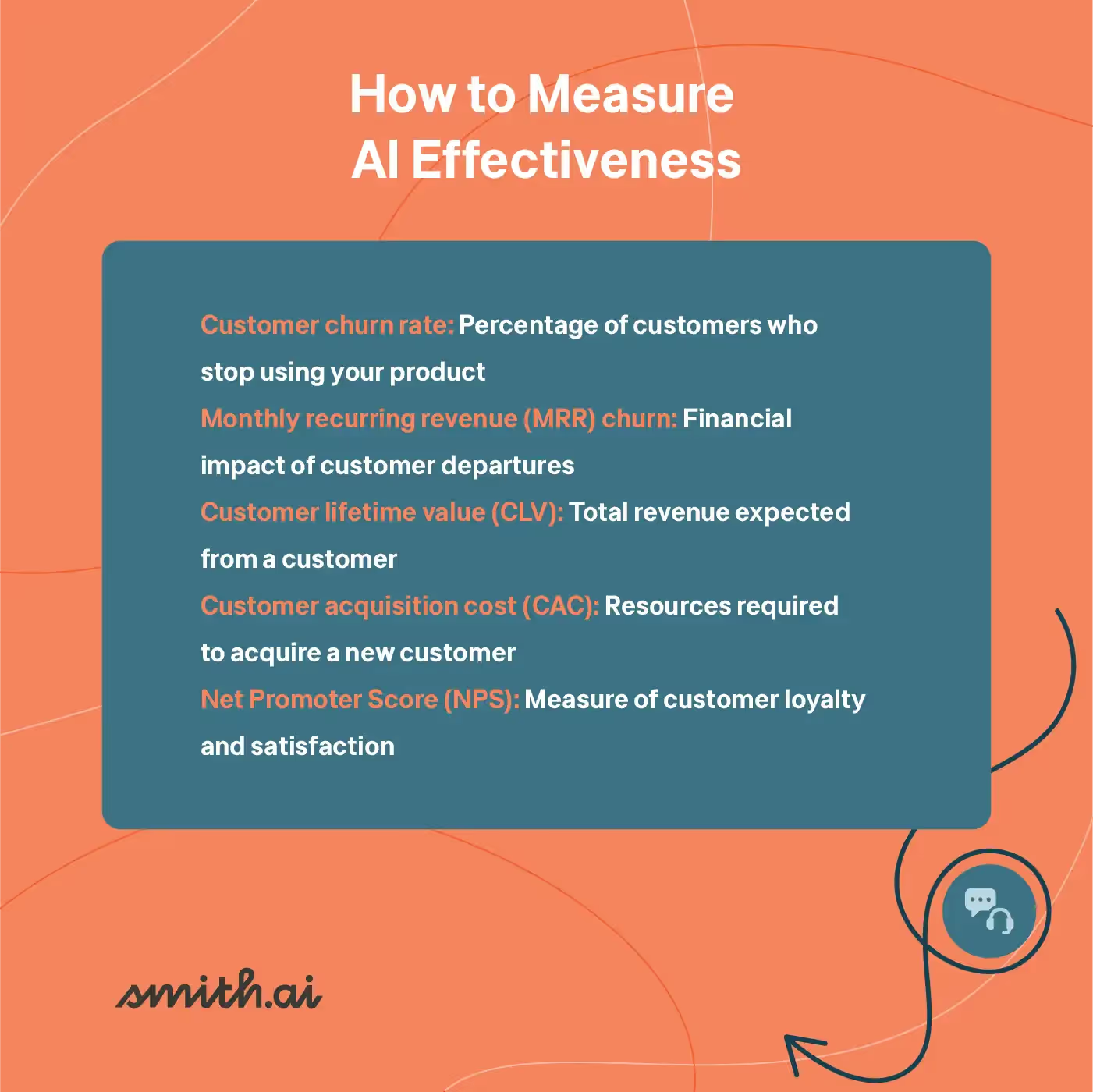Ways AI Actually Makes Customer Retention Easier
Ways AI Actually Makes Customer Retention Easier

Forget loyalty cards and promotional emails. Customer retention now lives in the world of AI.
AI turns overwhelming data into immediate action. Retailers craft personalized shopping experiences. Banks predict needs before customers recognize them. Healthcare providers create individualized care plans.
By 2025, companies that implement AI will dominate the market. Those effectively using retention AI will thrive while competitors struggle to catch up.
The verdict? Investing in loyal customers through AI delivers unmatched returns in today's business landscape.
Essential Customer Retention AI Technologies
As businesses focus on keeping existing customers, AI has become crucial for improving retention rates. Here are three key AI applications transforming how companies build loyalty.
Predictive Analytics: Seeing Tomorrow's Customer Behavior Today
Predictive analytics uses data, statistical algorithms, and machine learning to forecast what customers will do next. Unlike traditional analytics that just describe what happened, predictive models identify patterns to anticipate future actions. The market for this software was worth $5.29 billion in 2020 and is expected to reach $41.52 billion by 2028—a clear sign of its growing importance.
Predictive analytics is one of the key sales AI tools reshaping how companies forecast customer behavior.
Companies use several predictive models to boost retention:
- Response Modeling: Identifies customers likely to engage with specific campaigns
- Attrition Modeling: Pinpoints at-risk customers for proactive retention
- Brand Propensity Modeling: Recognizes customers interested in other brands in your portfolio
- Prospect Modeling: Finds the best external prospects for targeted acquisition
Sentiment Analysis: Understanding How Customers Really Feel
Sentiment analysis examines feedback, social media posts, reviews, and other text to understand customer emotions about your brand. This matters because feelings drive purchasing decisions and loyalty.
Think about this: one bad experience will drive away one-third of your customers, and just two or three negative interactions will lose you 64% of them. By catching negative sentiment early, AI can fix issues before customers leave.
AI-powered sentiment analysis offers several benefits:
- Early detection of potential problems
- Deeper understanding of customer needs
- Data-driven insights for product development
- Real-time feedback on how changes affect customer perceptions
This technology acts as an early warning system, helping you address concerns before they become major issues.
AI-driven Personalization: Beyond "Hello [First Name]"
Personalization today goes far beyond addressing customers by name. Modern AI systems analyze vast amounts of customer data, often sourced through CRM integrations, to create truly individualized experiences that keep people coming back.
E-commerce giants prove personalization works. About 35% of Amazon's sales come from product recommendations. Netflix reports that roughly 80% of viewer activity stems from personalized recommendations.
AI enables personalization through sophisticated techniques:
- Collaborative filtering: Suggests products based on similar customers' preferences
- Clustering: Groups customers with similar behaviors to refine recommendations
- Market basket analysis: Identifies products frequently purchased together
These technologies create hyper-personalized experiences by delivering the right product to the right person at the right time. Techniques like AI-powered advertising ensure that marketing messages are highly relevant to each customer.
Tactical Strategies & Actionable Methods in Customer Retention AI
Implementing tactical strategies with the help of essential AI tools can significantly improve customer retention.
AI Receptionists: Never Miss a Customer Connection
AI receptionists deliver consistent, 24/7 customer service. They ensure customers receive immediate responses whenever they reach out, boosting satisfaction levels.
These systems go beyond basic chatbots by handling complex inquiries, routing customers appropriately, and maintaining conversation context across interactions. They can also support outreach efforts by engaging leads through tailored outreach campaign plans. They learn from each exchange, constantly improving their ability to address customer needs.
To implement an effective AI receptionist:
- Define clear use cases and common customer inquiries
- Create seamless handoffs to human agents when needed
- Regularly update the AI's knowledge base
- Analyze conversation data for improvement opportunities
- Review virtual receptionist comparisons to find the best fit for your business
Behavioral Analytics: Stop Churn Before It Starts
Behavioral analytics helps you identify at-risk customers before they leave. By examining patterns in customer interactions, purchase frequency, and engagement metrics, AI algorithms can spot warning signs of potential churn.
A solid churn prediction system analyzes multiple data points:
- Changes in usage patterns or engagement frequency
- Support ticket frequency and resolution satisfaction
- Response to communications and campaigns
- Product feature utilization rates
By combining behavioral analytics with AI lead generation best practices, businesses can both prevent churn and attract high-quality leads.
To implement effective churn prediction:
- Define clear "at-risk" behavior indicators
- Create segmented intervention strategies based on risk level and customer value
- Develop automated triggers for proactive outreach
- Monitor intervention effectiveness and refine strategies
Personalized Communications: Messages That Feel Human
AI-driven personalization has evolved far beyond inserting a customer's name into an email. Today's systems analyze behaviors, preferences, and history to craft truly individualized communications.
Effective personalization strategies include:
- Tailoring content based on browsing and purchase history
- Adjusting message tone to match customer communication preferences
- Timing communications based on individual engagement patterns
- Adapting offers based on previous responses
By incorporating interactive marketing strategies, businesses can enhance personalized communications and engage customers more effectively.
Research shows personalization significantly impacts customer experience, with 5.2% of customers stating that agent empathy makes a difference in their experiences, compared to only 2.7% who prioritize low wait times. AI enables empathetic connection at scale by giving customer service representatives context-aware suggestions and insights.
Proactive Customer Service: Fix Problems Before Customers Notice
Proactive service identifies and resolves potential issues before customers need to reach out. AI enables this by monitoring product usage patterns, spotting anomalies, and triggering appropriate interventions.
Effective proactive service strategies include:
- Automated system health checks that identify potential problems
- Predictive maintenance notifications before product failure
- Usage pattern analysis that spots feature adoption challenges
- Automated assistance when customers struggle with complex tasks
A customer experience dashboard that aggregates signals across touchpoints provides a holistic view of each relationship. This allows early detection of satisfaction issues and targeted interventions.
AI-powered Loyalty Programs: Beyond Points Systems
AI transforms customer loyalty programs from static point systems to dynamic experiences that adapt to individual customer behaviors and preferences. These intelligent programs analyze purchase patterns and engagement history to deliver personalized rewards that drive specific behaviors.
Effective AI-powered loyalty approaches include:
- Predictive modeling to identify rewards most likely to drive desired behaviors
- Dynamic reward structures that adjust based on customer segments
- Personalized achievement paths matching individual interests
- Automated recognition of milestone events with contextual celebrations
Your programs should focus on maximizing customer lifetime value (CLV) by identifying and rewarding behaviors that correlate with long-term retention and increased spending.
Hybrid Human-AI Approaches: The Best of Both Worlds
The most effective retention strategies combine AI efficiency with human empathy. This hybrid approach uses AI for data analysis, pattern recognition, and routine interactions while deploying humans for complex problem-solving and emotional connection.
Successful hybrid approaches include:
- AI-augmented human agents receiving real-time suggestions and customer insights
- Seamless handoffs between AI systems and human representatives
- AI systems recognizing emotional cues and escalating to humans when needed
- Human review of AI-generated content before delivery to customers
By investing in both technology and in training managers for success, businesses can create a synergy between AI capabilities and human expertise.
Measuring AI Effectiveness: What Gets Measured Gets Improved

To ensure your AI strategies deliver value, establish clear success metrics. Key performance indicators to track include:
- Customer churn rate: Percentage of customers who stop using your product
- Monthly recurring revenue (MRR) churn: Financial impact of customer departures
- Customer lifetime value (CLV): Total revenue expected from a customer
- Customer acquisition cost (CAC): Resources required to acquire a new customer
- Net Promoter Score (NPS): Measure of customer loyalty and satisfaction
Monitoring these KPIs not only helps in measuring AI effectiveness but also offers insights on how to improve conversion rates at every stage of the customer journey.
Practical Implementation Challenges & Solutions
When integrating AI solutions into business operations, several common challenges can impede successful implementation. Understanding these hurdles and approaching them strategically can make the difference between success and failure.
Data Integration and Quality Issues
High-quality data forms the foundation of effective AI systems. Organizations often struggle with:
- Data silos across disparate systems
- Poor data quality leading to unreliable outputs
- Lack of standardization across data sources
These issues are costly. Organizations lose around $12.9 million annually on average due to poor data quality. The solution lies in implementing rigorous data cleaning, validation, and standardization processes, though these require initial investment.
Technical Infrastructure Limitations
About 95% of businesses anticipate AI will increase their IT infrastructure workload, yet infrastructure readiness remains low. Cost-effective solutions include:
- Using cloud infrastructure that scales automatically with demand
- Implementing containerization and microservices for individual component scaling
- Using caching and content delivery networks to optimize performance
Integration with Legacy Systems
Many businesses struggle to connect advanced AI with existing IT infrastructure. Rather than complete overhauls, consider:
- Taking a modular implementation approach
- Focusing on specific high-value processes first
- Using API layers to connect new AI capabilities with existing systems
Cost and Resource Constraints
AI implementation can be expensive, especially for small to medium-sized enterprises. To address this:
- Adopt a portfolio approach with a mix of small wins, achievable improvements, and ambitious goals
- Prioritize projects with clear ROI metrics
- Consider partnerships with specialized AI development companies to reduce internal resource needs
Cultural Resistance
Employee resistance due to fear of job displacement or distrust of AI can derail implementation. Solutions include:
- Investing in comprehensive training programs
- Involving employees in the AI development process
- Focusing on how AI augments rather than replaces human capabilities
By addressing these challenges strategically, businesses can implement AI solutions that deliver value without disrupting operations or breaking the bank.
Future Trends in Customer Retention AI
As AI technology evolves, several key trends will shape the future of customer retention strategies. The increasing importance of data analytics in marketing means that businesses must stay ahead of the curve. We're seeing a shift toward more sophisticated and ethically-minded applications that will transform customer connections.
Predictive Analytics Evolution
Predictive analytics will become increasingly refined, allowing businesses to anticipate customer needs with remarkable precision. By 2025, AI capabilities are expected to grow exponentially, with improvements in quality, accuracy, and automation. This means identifying potential churn before it happens and implementing proactive retention measures to create stronger customer loyalty.
Ethical AI Implementation
As AI integrates deeper into retention strategies, ethical considerations will be the major topic of discussions. The balance between personalization and privacy will be critical, with transparent data practices building essential trust. Customers must understand how their data is being used and maintain control over their information.
Using frameworks from PwC's Responsible AI toolkit can help establish trustworthy AI strategies that respect customer boundaries. Moreover, understanding AI data confidentiality is essential to protect customer information and build trust.
Generative AI Transformation
Generative AI will create unprecedented personalization. These systems will create unique promotions tailored to individual preferences and potentially develop new products based on emerging market demands. As generative AI matures, its impact on customer retention will offer novel ways to maintain a loyal client base.
The Bottom Line
There surely are many AI tools your business can use to improve customer retention. Of course, you’re not going to implement everything right away. Just pick the one you think will have the highest ROI for your particular business.
If you regularly communicate with current and potential customers, consider an AI Receptionist. Smith.ai uses a unique, AI-led, human-backed approach. Using AI to handle routine tasks and handing it off to a human receptionist for more complex tasks and inquiries.
Book a free consultation to see how Smith.ai can help your business today.
Take the faster path to growth. Get Smith.ai today.
Key Areas to Explore

Your submission has been received!











.svg)



